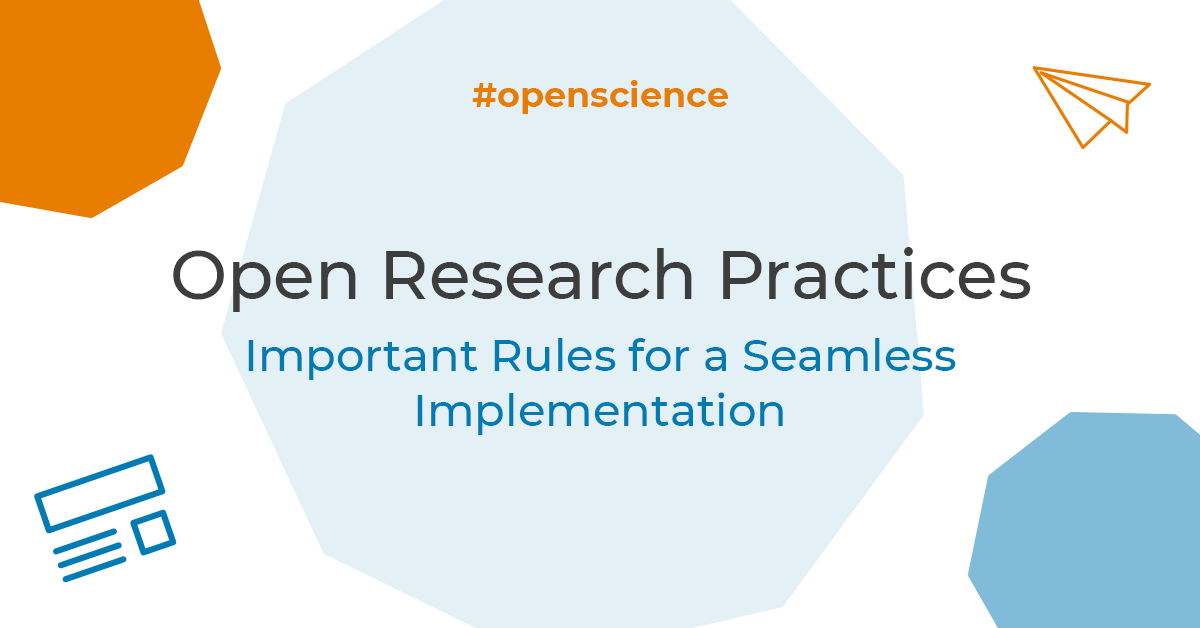The large number of practices and tools of Open Science and the possibilities they imply can be inspiring on the one hand. On the other hand they can be overwhelming. So, a little guidance on how to start may be helpful. To address this need, a team of authors formulated ten rules for implementing open and reproducible research practices. This blogpost gives you a short recap.
The paper "Ten simple rules for implementing open and reproducible research practices after attending a training course" offers guidance to beginners and advanced learners for implementing robust research practices in your own projects. It also includes strategies for convincing other members of the research team in case you might not know where to start.
Although the paper focuses on the situation after a training course, the rules drafted may be helpful to be considered in self-study situations too. The authors point to the fact, that in different research areas or environments different approaches might be helpful and that, in general, systemic changes are needed for pushing robust research practices on a broad scale. Not all rules can be applied equally. While the first five rules are primarily aimed at beginners, the other five mainly show paths for scientists that already have robust experience with Open Science.
The rules
Rule 1: Shortlist possible practices to implement in your current project
Focus on practices relevant to your research and matching your current project stage. Check if your institution or funder has for instance policies for Open Access, Open Data or research integrity that apply to your project. A shortlist of practices helps you to convince the members of your research group and keep your workload manageable.
Rule 2: Join a community to access expertise and support
Start with the people, who are essential for implementing practices in your own projects. Find allies, including people in supporting roles (like in libraries, IT services and Open Science offices) and look for courses or seminars to develop your skills further. Also consider joining a local, national, or international community which offers additional support and training, for instance journal clubs like ReproducibiliTea or the international Reproducibility Networks.
Rule 3: Talk to your research team about what to implement
Meet with your supervisor and other team members and find out their attitude towards implementing robust research practices. Prepare slides describing your learnings, the shortlist of practices, your reasons for selecting them and evidence on how they benefit the team’s research and individual careers. You may also organise a seminar with senior scientists having expertise in the practices that you have chosen. Keep in mind: your goal is not to criticize past work, but to suggest future improvements. Consider how factors like policies of your institution or funder can help you.
Rule 4: Prepare for resistance and address it constructively
Your team may have concerns that implementing robust research practices can cost time and resources, also taking time away from your project or from achieving your career goals in the current academic system. Choose arguments that directly address your colleagues’ concerns. Different reasons may resonate with different individuals. Identify which practices you can implement on your own and which practices require the support of others. If they are highly resistant to implementing practices, focus on easy wins first.
Rule 5: Decide what to implement and create an implementation plan
Make sure that the practices that you choose are feasible considering your limited time and resources. Begin with practices that are broadly supported by team members and easy to implement. Prepare an implementation plan containing the “who,” “what,” “when,” and “how” for each chosen practice. Anticipate possible challenges and look for advice or support.
Rule 6: Compromise and be patient
Focus on practices that can be implemented independently or with the agreement of the research team. If you have the capacity and will, offer to do implementation work on behalf of other team members. As research practices are evolving constantly, look for opportunities to move towards more robust practices. Be mindful of your own workload and remember that small changes will add up over time.
Rule 7: Reassess and adapt your implementation plan when circumstances change. Look after yourself.
Implementing new research practices can be challenging, so it's important not to commit to more than you can achieve. Be willing to reassess the plan and adjust expectations or take a step back when needed.Consider reaching out to your networks to look for support and for troubleshooting advice.
Rule 8: Share best practices and lessons learned
You can look for opportunities to support others in implementing some of the practices and to further disseminate them. Document the steps that you took to make your work more robust, so you can reuse them in the future. Be a role model and share your skills.
Rule 9: Get credit and make your contributions visible
Document your work on robust research for instance on repositories like Zenodo or the Open Science Framework (OSF) to make it visible. Also, include this information on your Curriculum Vitae (CV) and apply for awards ambassador programmes, grants or fellowships. Furthermore, you could consider getting involved in science improvement activities.
Rule 10: Seek out supportive future employers who value your skills and interests
When looking for a new job, seek out supportive employers who share your values, including robust research. Research the team, the institution, their values, practices and policies. And ask current or former team members about the team leader and team dynamics.
Tools and guidance for your next steps
The Open Economics Guide contains information that may be helpful for your next steps. Ready to get started with Open Science? Check out these five small steps you could make right now and have a look at the Open Economics Guide's catalog of free Open Science tools. The tool SHERPA Juliet contains, for instance, current information about the requirements of research funding organisations regarding Open Access, publications and data archiving.
